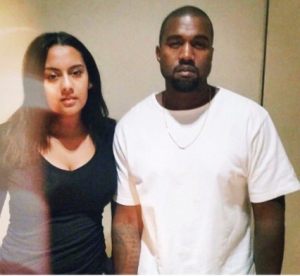Twenty-year old artist and songwriter Bibi Bourelly released her first single, “Riot,” on Soundcloud in spring of 2015. Featuring lyrics such as “You gon’ see the fire in my eyes… I’m fighting for my life,” “Riot” served as Bourelly’s manifesto as an artist, showing promise with its soaring chorus and combative tone. Accompanied by a live guitar, Bourelly’s voice sounds jagged, hoarse, and vulnerable. If “Riot” were sung at an actual protest, Bourelly would be the last woman standing, strumming her guitar until her fingers bled, shouting through cracks of vocal exhaustion. Her voice is precise but desperate, pleading; when Bourelly sings “I’m fighting for my life” it sounds literal, like this young Berliner has seen it all.
And she has seen quite a bit. Although she is both Haitian and Morrocan, Bourelly was born in Berlin, Germany to a musical father and an artistic mother. In a Vice interview, she recalls that she “grew up with bass players from Senegal and Ghana in [her] kitchen talking about conspiracy theories.” This environment encouraged her to begin communicating through song; she started writing songs at the age of four and she later went on tour with her father, renowned guitarist Jean-Paul Bourelly.
As she grew up, Bourelly struggled through school and resorted to music as her tool for expression, claiming it to be the only thing she was good at. After consistently receiving Ds and Fs in her high school years, Bourelly moved across seas to the United States in order to finish her education. She did finish—but only after taking summer classes and graduating after her peers. She recalls being taunted for finishing late, and, feeling uncertain about her future but confident that college would never be for her, Bourelly decided to dedicate herself to the one thing she believed in. She booked a one-way flight from Maryland to Los Angeles, California—a city she had never been to before—to start her career as an artist.

In LA, Bibi began spending days and nights in the studio to work on her craft. After cutting a record deal with Def Jam, Bourelly was quickly tapped by Rihanna, who saw potential in Bourelly’s “Bitch Better Have My Money,” and released it last summer as a daring, leftist single (for more detail, check out my previous article on the song). Rihanna then had Bourelly pen two more cuts for her own album Anti, the vulnerable “Higher” and ballsy “Yeah I Said It.” Bourelly started to gain momentum and soon the Berliner who was once taunted for stumbling through high school, was writing for some of the biggest names in music—Rihanna, Kanye West, Selena Gomez, Usher, and Naz.
But the time has now come for Bourelly to craft her own path for greatness. After gaining exposure performing at SXSW and on James Corden and Jimmy Fallon, Bourelly has released her debut EP Free The Real (Pt. #1), last Friday. It crafts all of her upbringing—high school in Maryland, the “subway carts and graffiti” of Berlin, late night summers in Los Angeles—into five beautifully written and produced tracks.
Free The Real (Pt. #1) starts off with “Sally,” an empowering, aggressive rock number that finds Bourelly practically commanding us to take action, and quite bluntly to “F*ck all the haters.” We then get a taste of Bourelly’s powerhouse vocals and wildly talented lyricisms with “Ego,” a snarled hip-hop ballad that Bourelly wrote upon her arrival to Los Angeles. “I’m nineteen years old with a big ego / Got holes in my pants but a sick flow,” she sings over slapped guitar production that could easily score a standoff in an old Western flick. The midpoint of the EP—“Guitar”—is the heart of the album, showcasing Bourelly’s Berliner roots and featuring the guitar chops of her father. The tune (featured on this week’s Music Monday post) combines lush, warm production with foreign-sounding grit; it is a powerful and edgy tribute to the streets of her homeland, the “badass kids running from poli,” and the artist’s own up-bringing. When Bourelly screams “Play the guitar for me,” you begin to get the feel that music has always coursed through her veins. In Bourelly’s music, you’ll find a blend of genre and ambition that knows no bounds: a melodic tilt when she is rapping, a conversational tone in her impressive, soulful voice, and a surprisingly vulnerable head voice.
The last two tracks are stripped down ballads—“What if I Told You” and “Riot.” “What if I Told You” is Bourelly’s response to the bullies who questioned her talent: “What if I told you / that I failed out of school” she yells, as her voice breaks and bends dangerously. She closes Free the Real (Pt. #1) with the aforementioned “Riot” which would sit comfortably alongside the empowered bent of rapper M.I.A. with the grit of classic soul running throughout. It would make a great radio single if only as an introduction to Bourelly—everything on this album is equally as strong. Throughout the EP, Bourelly stretches her instrument between deliberate speak-singing and distressed belting to convey a full palette of human emotions.
“Riot” also takes us back to before Bourelly became “known”—back to when she had just taken that one-way flight with nothing to fall back on. The thumbnail for the Youtube video of “Riot” features an Instagram picture of Bourelly from that time—slouched over in a car trunk, wearing a flowing, black sports jacket and white kicks. With her long black hair pulled back and her arms on her knees, Bourelly looks poised to ascend the pop throne—on her own terms.
~Shane
Listen to Bibi Bourelly’s full EP, “Free The Real (Pt. #1)” on Spotify below.

